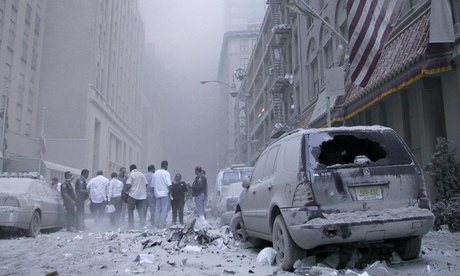
Richard Bausch, a highly respected American novelist and short-story writer, is best known in the UK for his outstanding 2009 novella Peace, which charts the lives of a small platoon of American soldiers in Italy in 1944. That book, like much of his fiction, involves a kind of collision of scale. It pits ordinariness against extremity, asking what happens when normal people are caught up in life-changing events. In his new novel, Bausch applies a similar scrutiny to modern America’s defining catastrophe. Although Before, During, After is a 9/11 novel, the events of that day aren’t exactly what it’s about. Rather, Bausch is interested in the fallout from a more intimate kind of attack.
In spring 2001, Natasha, a lonely congressional aide in her early 30s, meets Michael, a divorced, disillusioned Episcopalian minister. The couple quickly fall in love and become engaged. Natasha quits her job in Washington and arranges to start a new life with Michael in Memphis. Late that summer, just before making the move, she goes on holiday with a friend in Jamaica. Her scheduled return date is 11 September. Stranded on the island in the wake of the attacks (flights are shut down), she and her fellow American tourists respond by getting drunk. Natasha has grounds to feel panicked: Michael is in Manhattan attending a wedding, and he’d talked of a breakfast trip to the World Trade Centre. For nearly 24 hours she can’t get hold of him. It is in this context of dissolution and dread that she gets stoned on the beach with a fellow tourist, an encounter that concludes with her violent rape. (It isn’t spoiling anything to reveal this, since it’s mentioned on the dust jacket.)
There’s a really interesting idea here, to do with one kind of tragedy being subsumed by another, and the difficulty, when this happens, of disentangling the two. How can Natasha get a purchase on her assault when she feels from the outset that to make a fuss about it would be selfish? The minimisation of sexual violence is a problem both for society as a whole and for its individual victims. By setting Natasha’s rape against the backdrop of 9/11, Bausch is able to explore, in a particularly convincing way, how this pressure operates.
Such a storyline is not without risks: juxtaposing 9/11 and a rape might seem contrived (two assaults, two types of violation), and the thought of an older man (Bausch was born in 1945) inhabiting the mind of a rape victim won’t necessarily sit easily with everyone. But Bausch, in both cases, steers clear of the obvious pitfalls. He doesn’t labour the metaphorical connection, and he portrays Natasha’s feelings with great sensitivity, showing how her understandable desire to wish the assault away ends up proving highly corrosive.
Yet the novel falls short in some significant ways. Bausch is a committed realist, concerned to render life recognisable. Sometimes this causes him to lay the details on too thick. The novel’s pace is glacially slow, and although it’s true that people often do carefully consider what to have for breakfast, or whether to have a third glass of wine, should we be hearing about it quite so often? (Bausch is particularly fond of mentioning the “aroma of coffee”, which makes the whole novel feel as if it takes place in Starbucks.)
Conversely, Bausch is sometimes slipshod. For instance, it seems bizarre that, in the immediate aftermath of 9/11, Natasha doesn’t email Michael; she just phones him repeatedly. (This was hardly the pre-internet era.) When she does finally think of bringing charges, the legal complications are sketchily dealt with. In a different kind of novel, such things wouldn’t matter, but when verisimilitude is your game, any small departure from it can feel like a major failing. So this novel ends up in a frustrating middle ground: overly attentive in some ways, it lacks attentiveness in others, and the upshot is that, despite Bausch’s considerable talents, it isn’t quite as good as it could be.
Before, During, After is published by Atlantic Books (£14.99). Click here to buy it for £11.99

